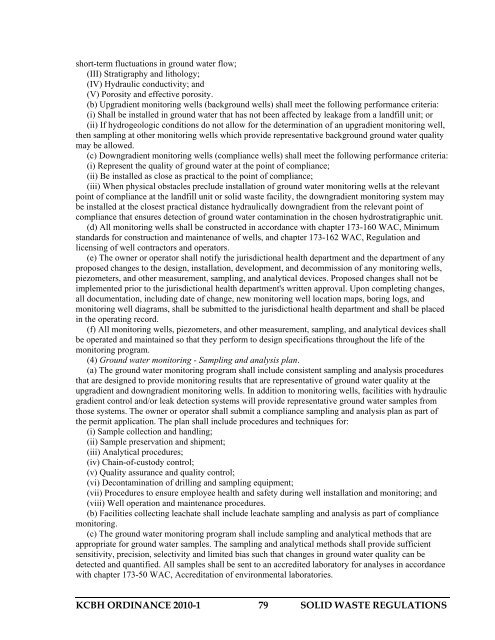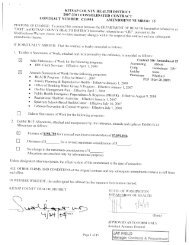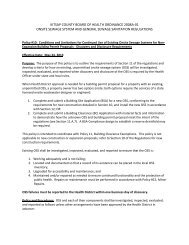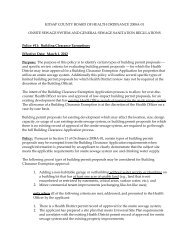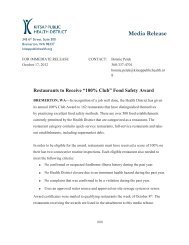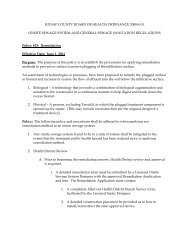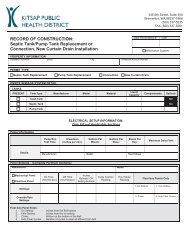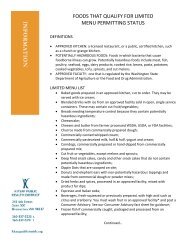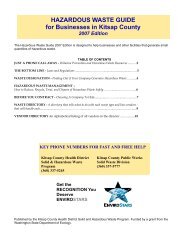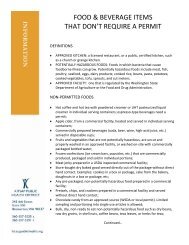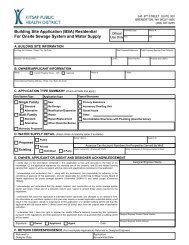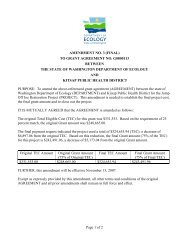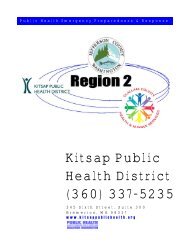SOLID WASTE REGULATIONS - Kitsap Public Health District
SOLID WASTE REGULATIONS - Kitsap Public Health District
SOLID WASTE REGULATIONS - Kitsap Public Health District
Create successful ePaper yourself
Turn your PDF publications into a flip-book with our unique Google optimized e-Paper software.
short-term fluctuations in ground water flow;<br />
(III) Stratigraphy and lithology;<br />
(IV) Hydraulic conductivity; and<br />
(V) Porosity and effective porosity.<br />
(b) Upgradient monitoring wells (background wells) shall meet the following performance criteria:<br />
(i) Shall be installed in ground water that has not been affected by leakage from a landfill unit; or<br />
(ii) If hydrogeologic conditions do not allow for the determination of an upgradient monitoring well,<br />
then sampling at other monitoring wells which provide representative background ground water quality<br />
may be allowed.<br />
(c) Downgradient monitoring wells (compliance wells) shall meet the following performance criteria:<br />
(i) Represent the quality of ground water at the point of compliance;<br />
(ii) Be installed as close as practical to the point of compliance;<br />
(iii) When physical obstacles preclude installation of ground water monitoring wells at the relevant<br />
point of compliance at the landfill unit or solid waste facility, the downgradient monitoring system may<br />
be installed at the closest practical distance hydraulically downgradient from the relevant point of<br />
compliance that ensures detection of ground water contamination in the chosen hydrostratigraphic unit.<br />
(d) All monitoring wells shall be constructed in accordance with chapter 173-160 WAC, Minimum<br />
standards for construction and maintenance of wells, and chapter 173-162 WAC, Regulation and<br />
licensing of well contractors and operators.<br />
(e) The owner or operator shall notify the jurisdictional health department and the department of any<br />
proposed changes to the design, installation, development, and decommission of any monitoring wells,<br />
piezometers, and other measurement, sampling, and analytical devices. Proposed changes shall not be<br />
implemented prior to the jurisdictional health department's written approval. Upon completing changes,<br />
all documentation, including date of change, new monitoring well location maps, boring logs, and<br />
monitoring well diagrams, shall be submitted to the jurisdictional health department and shall be placed<br />
in the operating record.<br />
(f) All monitoring wells, piezometers, and other measurement, sampling, and analytical devices shall<br />
be operated and maintained so that they perform to design specifications throughout the life of the<br />
monitoring program.<br />
(4) Ground water monitoring - Sampling and analysis plan.<br />
(a) The ground water monitoring program shall include consistent sampling and analysis procedures<br />
that are designed to provide monitoring results that are representative of ground water quality at the<br />
upgradient and downgradient monitoring wells. In addition to monitoring wells, facilities with hydraulic<br />
gradient control and/or leak detection systems will provide representative ground water samples from<br />
those systems. The owner or operator shall submit a compliance sampling and analysis plan as part of<br />
the permit application. The plan shall include procedures and techniques for:<br />
(i) Sample collection and handling;<br />
(ii) Sample preservation and shipment;<br />
(iii) Analytical procedures;<br />
(iv) Chain-of-custody control;<br />
(v) Quality assurance and quality control;<br />
(vi) Decontamination of drilling and sampling equipment;<br />
(vii) Procedures to ensure employee health and safety during well installation and monitoring; and<br />
(viii) Well operation and maintenance procedures.<br />
(b) Facilities collecting leachate shall include leachate sampling and analysis as part of compliance<br />
monitoring.<br />
(c) The ground water monitoring program shall include sampling and analytical methods that are<br />
appropriate for ground water samples. The sampling and analytical methods shall provide sufficient<br />
sensitivity, precision, selectivity and limited bias such that changes in ground water quality can be<br />
detected and quantified. All samples shall be sent to an accredited laboratory for analyses in accordance<br />
with chapter 173-50 WAC, Accreditation of environmental laboratories.<br />
KCBH ORDINANCE 2010-1 79 <strong>SOLID</strong> <strong>WASTE</strong> <strong>REGULATIONS</strong>


